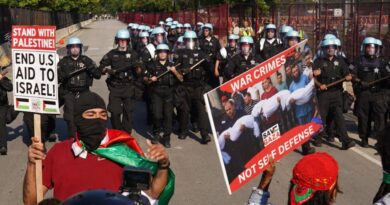City of Brotherly Love: Tough Love Needed to Combat the Scourge of Tranquilizer Abuse

Last week I detailed how obtaining the most dangerous drugs on the streets of New York is remarkably simple.
I also discussed how “safe-use” sites have turned into hubs for dealers and drug users, sparking debate on their effectiveness.
Do these sites promote safe drug use or normalize deadly behavior?
To gain insight, I ventured to the streets of another East Coast city.
Twenty years ago, Philadelphia exuded pride. Today, it is plagued not only by crime but by drugs.
One particular area, Kensington Avenue, has gained infamy throughout the country.
This area is not only home to extreme scenes but is also densely populated with human suffering on an unimaginable scale.
Unlike West Coast cities where human misery is more spread out, in Philadelphia, it is concentrated and overwhelming.
During my visits in the past year, I have been not only shocked and disgusted but deeply saddened by what I have witnessed.
Walking the streets of Kensington during the day is hazardous enough; at night, it becomes a no-go area even for hardened addicts unless they are making purchases.
Visible throughout the day are people injecting drugs and passersby passed out or rummaging through their belongings or frozen in a nightmarish state, demonstrating the potency of the drugs in circulation.
While walking towards a clinic that aids these individuals, I witnessed a young man injecting drugs in front of me. He stumbled down the street, eventually collapsing in a heap. A schoolgirl nonchalantly asked me if he was dead, revealing the level of desensitization in the area.
One organization working to address this crisis is Savage Sisters, led by the exceptional Sarah Laurel, a former addict who established the organization to support Kensington residents struggling with addiction.
The volunteers distribute clean needles, administer the reviving drug Narcan, provide warm drinks, and offer care to those in need.
Most crucially, they tend to the wounds of addicts who seek help, offering informal medical care as a lifeline.
Spending a morning with them, I observed individuals coming in, some passed out beside me, others with severe injuries likely caused by a potent and deadly drug, xylazine.
At Savage Sisters, I met Paul, a 29-year-old addict using xylazine for a couple of years, his body covered in boils and open wounds, a stark contrast to his previous health before the drug’s introduction.
Paul revealed how xylazine had caused unprecedented health issues and open wounds, leading to a significant decline in his physical wellbeing.
Despite efforts to clean his wounds, Paul’s condition worsened, a stark reminder of the devastating impact of xylazine on individuals.
Volunteers at Savage Sisters, while providing essential support, were grappling with severe cases of necrosis and injuries that may necessitate amputation, underscoring the dire situation in Philadelphia.
As I delved deeper, I learned that Philadelphia’s hospitals were overwhelmed by overdose cases, with more deaths involving xylazine than ever before.
Amid the chaos, volunteers like Sarah Laurel are on the frontlines, struggling to address the crisis with limited resources and no scientific data on xylazine’s effects on the human body.
Advocates like Sarah propose a safe-supply model to ensure drug testing for lethal toxins, although the notion of “safe” heroin remains controversial.
Republican Mayoral candidate David Oh vehemently opposes safe-supply, emphasizing the need for law enforcement intervention to combat the drug crisis.
As I navigated the streets, I encountered Esther Ann, a woman searching for her missing relative on Kensington Avenue, a poignant reminder of the devastating impact of addiction on families.
Esther’s emotional quest for her missing relative highlighted the anguish and desperation experienced by families torn apart by addiction.
This grim reality underscores the need for comprehensive solutions to address addiction, prevent further tragedies, and support communities ravaged by the drug epidemic.
Visiting Philadelphia unveils the harsh reality of unchecked addiction and the pressing need for intervention to prevent the normalization of such devastating circumstances.
Witnessing the repercussions of addiction firsthand serves as a stark reminder of the dangers posed by unregulated drug use and the urgent need for decisive action to prevent further casualties.



